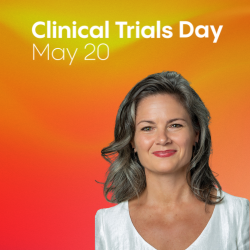This is a sponsored message.
Clinical trials have been the foundation of medical research for almost 250 years. James Lind, a Scottish naval surgeon and physician, is widely credited with performing the first comparative clinical trial. Dr. Lind’s study, which began on May 20, 1747, carefully evaluated different regimens, including citrus fruit, for the treatment of scurvy (vitamin C deficiency). For that reason, every May 20 we proudly join the scientific community in celebrating Clinical Trials Day.
For more than a century, Lind’s innovative research was overshadowed by the achievements of other famous inventors of the era, such as Benjamin Franklin, fellow Scotsman James Watt, and vaccine pioneer Edward Jenner. Then in 1896, Lind was mentioned in a book entitled “Heroes of Medicine,” which ultimately led to acclaim for his vital contribution to the health of mariners and his foundational work in clinical trial design.
On Clinical Trials Day, we recognize the dedicated heroes of medicine today who contribute countless hours to advancing human health through their work conducting clinical trials worldwide. We also celebrate progress in medical research and how together we can accelerate future innovations in human and public health.
Clinical Trials and the Power of Innovation
Today, our protocols remain rooted in the foundational scientific principles established through Lind’s work, with an ongoing commitment to scientific rigor through controlled trials that evaluate the safety and efficacy profiles of novel medicines and vaccines. These trials are conducted with a steadfast commitment to the highest ethical standards and an unwavering focus on patient welfare.
Critically, we’ve learned that clinical trials require seamless interdisciplinary collaboration to generate high-quality evidence that yields actionable insights for greater scientific good. From the inventors to the investigators, and most importantly, to the volunteer participants who make trials possible, it’s only as a scientific community that we can advance medicine. Thanks to our collective efforts, we are making great strides in many areas of medicine that are providing tangible benefit to patients. When one considers the advances in biomedical sciences and our deeper understanding of the human body since Lind’s day in the 18th century, it’s astonishing. Nevertheless, the burden of disease remains all too real and our work in clinical research lies at the heart of translating these breakthroughs into meaningful therapeutics for patients.
The Next Evolution in Clinical Research
Clinical research is evolving again as researchers seek to harness the power of new technologies that are fueling our digitized world. Across the biopharmaceutical industry and academia, we’re exploring new digital health technologies that allow patients to remain closer to home and report data on their own, not requiring clinic visits. Decentralizing some of the trial components promises to ease the burden on patients and sites. We call this approach “hybrid trials.” It is hoped that hybrid trials will significantly improve the experience for participants, thus increasing enrollment and retention as well as patient diversity. And as we know, health equity benefits the accuracy of our research. Someday, medical historians will likely note this era of research and how we’re finally involving the participants we should.
Ensuring greater diversity in clinical trials presents a particularly complex challenge to the research process, and it’s only through collective action that we’ll overcome it. We’re making progress but it’s not enough. It’s going to take all of us tackling the issue to ensure that our trials represent all of the patients we serve.
On May 20 and throughout the year, I reflect on how far we’ve come since Lind’s first experiment. When you consider the weight of humankind’s advances, and the innovations that have resulted from clinical research, we know we are on the right track. We owe it to the researchers who came before us to build on their work and make clinical trials even better, starting with establishing a more equitable experience for patients everywhere.
Thank You for Placing Trust in Us
Clinical Trials Day is about the importance of research, and it’s about the people who volunteer in an effort to advance science. Today and every day, we’re grateful to the patients, caregivers, and families who are our partners in research. None of this work can be done without you, and science can only advance through collaboration.
Thanks to your commitment, we can bring forward new medicines and vaccines that save and improve lives. You are our innovation partners, and we appreciate the trust you place in us – we’ll continue earning it every day.
Our gratitude to everyone this Clinical Trials Day for being with us on this journey. Here’s to the next clinical trial advancement and the science it delivers.
Author: Andy Lee, Senior Vice President and Head, Global Clinical Trial Operations (GCTO), Merck




